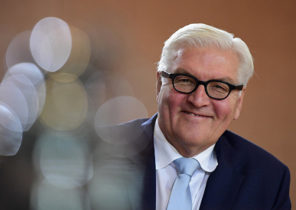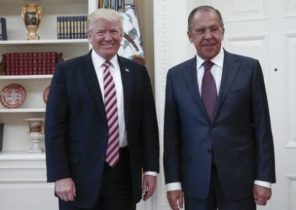
The truce in Syria, brokered by Russia, Turkey and Iran, laid the foundations of the peace talks between the Syrian government and the opposition, which will be held in Kazakhstan. The President of Kazakhstan Nursultan Nazarbayev will take on the role of peacemaker, and the talks will allow the new US administration is also to participate in them. However, it remains unclear how this process will be consistent with the proposed “Grand bargain” between Vladimir Putin and Donald trump.
Regardless of the US role in this process, the formation of the triumvirate of Russia, Iran and Turkey in itself is an extremely important event. At least on paper, these three countries are not natural allies. On the contrary, in the past they were enemies and fought wars, the consequences of which are still being felt today. During the cold war, Turkey was a key NATO member, Iran has supported the Afghan rebels who fought against the Soviet Union, the Soviet Union supported Iraq in its struggle against Iran.
However, after the collapse of the Soviet Union, Russia’s relations with Turkey and Iran improved significantly. The objections of Iran against the actions of Russia during the two Chechen wars of the 1990s years have been extremely restrained. Russia was worried about foreign ideological influence on its predominantly Sunni Muslim population, but it is much more afraid of Wahhabism in Saudi Arabia than the influence of the Iranian Shiites.
Moreover, Russia has maintained close relations with both sides in regional conflicts. This meant continuing economic cooperation with Iran, despite its desire to contain Iran’s influence in the long term, as well as maintaining good relations with the countries to which Iran poses a direct threat, particularly with Israel but also with Saudi Arabia.
There and back again
Russia’s relations with Turkey remain the closer, but they also saved a lot of contradictions. Turkey opposed Russia’s annexation of the Crimean Peninsula, but agreed to the implementation of the project “Turkish stream” pipeline, which should pass under the Black sea bypassing the territory of Ukraine, which further weakened it.
The fact that Russia and Turkey have supported opposite sides in the Syrian conflict added tension in their relationship. The turning point was the incident with the Russian military plane shot down by Turkish air force in November 2015. However, this crisis paradoxically showed the extent to which the disintegrated relations between Turkey and the West. Friendly relations between the two countries were restored in June 2016, and unconditional support for Putin Turkish President Erdogan during an attempted coup in Turkey further strengthened their relationship.
The war in Syria and anti-Russian protests in Turkey in connection with the actions of Russia in Aleppo has not prevented the recovery of the official friendship between the two countries. Russia and Turkey had done everything possible to murder the Russian Ambassador in Ankara has not broken their Alliance.
Meanwhile, Turkish-Iranian relations cooperation and rivalry traditionally periodically replace each other, but since the inception of the protest movement of the Arab spring rivalry prevailed. When the “Party of justice and development,” Erdogan turned against the secular, modernizing values of Ataturk, the founder of the Republic, the rivalry between Turkey and Iran has moved from the realm of political ideology (secularism vs theocracy) in the area of identity (Sunnis vs Shiites).
However, fear of the “Shiite Crescent” led by Iran existed even before the founding of the Islamic Republic of Iran. Like previous criticism of Turkish “neo-Omasta” from Russia and concern of the West in connection with the Russian “Eurasianism”, this fear is a fear of the revival of the Imperial project.
This is the paradox underlying the triad Russia-Turkey-Iran: their long-standing geopolitical rivalry not only leads to periodic conflicts between them, but also their cooperation.
The triumphs of the past
Russia, Turkey and Iran had empires before becoming nation States. Like the Western empires, and unlike China, they lost most of their territories, which was formerly run by. However, the reduction of the territories were not as significant as in the case of Western European empires, and they still retain elements of their former Imperial role. The Imperial past has not been fully rejected by them, it remains part of their national psychology.
The West has had a significant impact on these three States, but none of was never under the control of the West. In these three States attempts to carry out the modernization and Westernization from the top down has been replaced with anti-Western sentiment and a return to what is considered more traditional forms of political culture. Turkish scholar Ayse Zarakol (Ayse Zarakol) writes about how much on self-perception and foreign policy of these countries is affected by dissatisfaction due to the fact that the West has excluded them from among its members, however, leading experts in international relations tend to ignore these “irrational” factors.
In Turkey, as in Iran and in Russia, domestic and foreign policy is largely determined by their ambiguous relations with the West and globalization, and the similarity of their experience indicates that they are able pretty well to understand the behavior and concerns of each other. With this advantage, they can quickly move from conflict to cooperation.
As the authorities of the three countries concerned by the behavior of residents of the breakaway territories, which may try to secede, all they are interested in, to prevent the formation of Kurdistan. They are also interested in preventing regime change and the disintegration of neighboring States if they do not control this process.
Such a relationship was characteristic of European great powers in the 19th century: it was a competition, but all they were interested in keeping each other unless some sort of power begins to claim to dominance. They can wage war or to weaken each other by supporting rebel movements, but together they rise to fight separatism and instability when they begin to contradict their interests.
Perhaps the best example in this sense can serve as a “Holy Alliance” of Russia, Prussia and Austria, who were protecting each other from what they considered to be destabilising ideas and influences. This trio, which has never been particularly strong and cohesive unit, managed quite successfully to suppress the revolution of 1848. Later this Alliance was revived in the form of a Union of three emperors, Bismarck. In the end, Germany was not able to prevent the conflict between Russia and Austria-Hungary in the Balkans, the Union collapsed, and its collapse indirectly led to the outbreak of the First world war.
The Union of competing powers were less dangerous in comparison with the subsequent division of Europe into two opposing and powerful Alliance — and it should not be considered a bad parallel with the reborn triumvirate in the South-Eastern flank of Europe. If the Union of Russia, Turkey and Iran will remain relatively free, they will be able to restrain each other’s actions. But if it escalates into a full-fledged Alliance, the consequences can be unpredictable.







